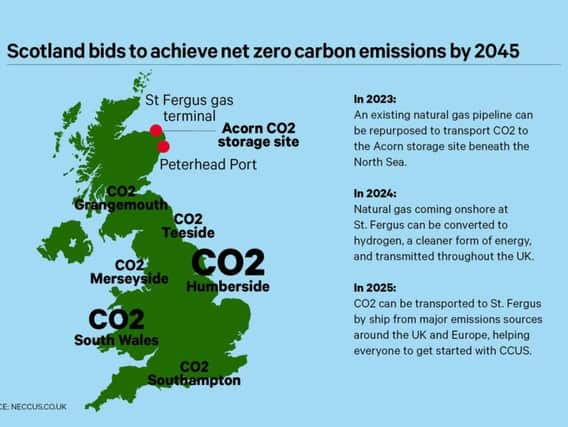Pioneering carbon storage scheme could be in place in Scotland by 2024


The announcement comes as a special new charter is signed at Holyrood today.
The agreement – between the newly formed North East Carbon Capture, Usage and Storage Alliance (Neccus) and the Scottish Government – outlines a joint commitment to decarbonise some of the country’s biggest emitters of greenhouse gases.
Advertisement
Hide AdAdvertisement
Hide AdIt also lays the foundations for establishing a new “carbon dioxide takeaway” industry that will capitalise on Scotland’s unique geology, world-leading offshore expertise and established oil and gas infrastructure.
The Acorn carbon capture and storage scheme, based at St Fergus gas terminal near Peterhead, will be the first project taken forward under Neccus and could be operational by 2024.
In its early stages it will have the capacity to deal with around half of all carbon dioxide emissions from industry in Scotland – around five million tonnes a year – with potential to accommodate up to 40 million tonnes when at full scale.
Existing gas pipelines will be repurposed to transport carbon dioxide from industrial centres such as Grangemouth to Peterhead to be disposed off, while the town’s deep-water port will allow shipments to be brought in by sea.
A plant will also be set up at the site to turn natural gas into cleaner hydrogen, which can be used to heat homes and businesses and power lorries, buses and trains while emitting only water as a byproduct.
Other schemes could join the network in the future, opening up possibilities for an international market.
Experts say carbon capture and storage is an important mechanism for tackling climate change and necessary for achieving Scotland’s 2045 net-zero emissions target.
“The time is now right to continue the energy transition by addressing the hard to decarbonise sectors like heat, heavy industry, transport and chemicals,” said chief executive Mike Smith. “Neccus, with its unrivalled support from all sectors of industry, academia and government, is now set to do just that.”
Advertisement
Hide AdAdvertisement
Hide AdNeccus has backing from the likes of SGN, SSE, Total, Shell and PetroIneos, as well as scientific institutions and Scottish Enterprise.
Professor Stuart Haszeldine, director of Scottish Carbon Capture and Storage research group, says Scotland is ideally placed to take the pioneering technology forward “securely, quickly and cheaply”, bringing major benefits for the environment and the economy.
He says storing carbon in rocks deep under the sea mimics what happens in nature and locks it up more securely than carbon sinks such as trees and peatlands.
The Acorn project, run by Pale Blue Dot Energy, is just the first step in what he describes as a new “decarbonisation revolution” that will maintain offshore jobs, create new opportunities and help Scotland meet its climate targets.
Speaking ahead of the signing, Scottish energy minister Paul Wheelhouse said: “I am delighted to see the Neccus alliance taking shape.
“This represents a significant step forward in collaboration between the important and vital partners with tremendous expertise who will help realise the deployment of carbon capture, usage and storage in Scotland.”
But climate campaigners have criticised the move, calling for governments to focus on renewable energy solutions.
Caroline Rance, from Friends of the Earth Scotland, said: “Carbon capture and storage is a dangerous distraction from the critical task of urgently cutting emissions, ending our use of fossil fuels and delivering transformational change across our society.
Advertisement
Hide AdAdvertisement
Hide Ad“Relying on the false solutions of CCS and hydrogen gives polluting oil and gas companies the excuse they need to keep on extracting fossil fuels for years to come.
“You only need to look at the list of backers for this project, which includes two of the world’s biggest polluters, Shell and Total, to see this.”